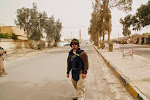Reconstruction is in progress everywhere you look in this formerly war-torn city, which used to be called "The Most Dangerous City in the World." Local Iraqis are working hard throughout their city to clean up debris, construct fences, rebuild medians with colorful
pavers, construct flower boxes and traffic circles, and install street lights.
From what I understand, there is enough work available that anyone who
wants work,
can get work. In the case of unskilled laborers, it may be physical labor like construction, debris removal, fence building, street sweeper, etc., but everyone that is willing to work has a job. The pay for an unskilled laborer begins at $8.00 per day, but that is better than risking one's life for a one-time payment of $50.00 to plant an
IED for Al
Qaeda or other insurgents.
Route Michigan, the main highway through the city, was just re-opened two weeks ago for end-to-end travel for the first time in over three years. Traffic, pedestrians, and commerce have capitalized on that re-opening, and the city is returning to normalcy. Iraqi Police units man the numerous checkpoints, alongside US Marine
advisors, to insure that the citizens remain safe.
Many of the former Combat Outposts,
SP's (Strong Points) and other U.S. military posts have been turned over to either the Iraqi Army or the Iraqi Police. The U.S.
military's goal is to turn over all these strategic positions and forts to the Iraqis, and a great deal of progress has been made on that front.
John and I spent one night and two days with Marines of the 2/8 Weapons Company, who occupy a JSS (Joint Security Station) alongside IP (Iraqi Police) forces. They eat, sleep, train, patrol, and stand watch side by side with Iraqi's who want nothing more than to restore peace, normalcy, and opportunity to their country. After spending a couple of days with these Iraqis, I can honestly say that they are extremely dedicated to their jobs, and demonstrate initiative that surprises even their US Marine Corp advisors. Captain Martin explained that the Iraqis had recently taken it upon themselves to drive their vehicles to a central maintenance point for scheduled maintenance, rather than convoy with U.S. military forces. The IP told Martin that it was better for everyone that way, without any lag time in vehicle upkeep.
The Iraqi Police are
very serious about cadre' discipline, as we discovered our first night at the JSS. We were escorted to the detention cells where suspects are held until an Iraqi Judge can arraign them, and saw an Iraqi Police Officer in one of the cells. Our escort asked him why he was in jail, and he explained that he had come to work without shaving! Now, for those of you without a military background, this may sound a little extreme. I can say from personal experience that the US Marine Corps will tolerate some things, but an unshaved face or a dirty weapon are not on that list! Obviously, the Iraqi Police had adopted this Marine credo, too.































































